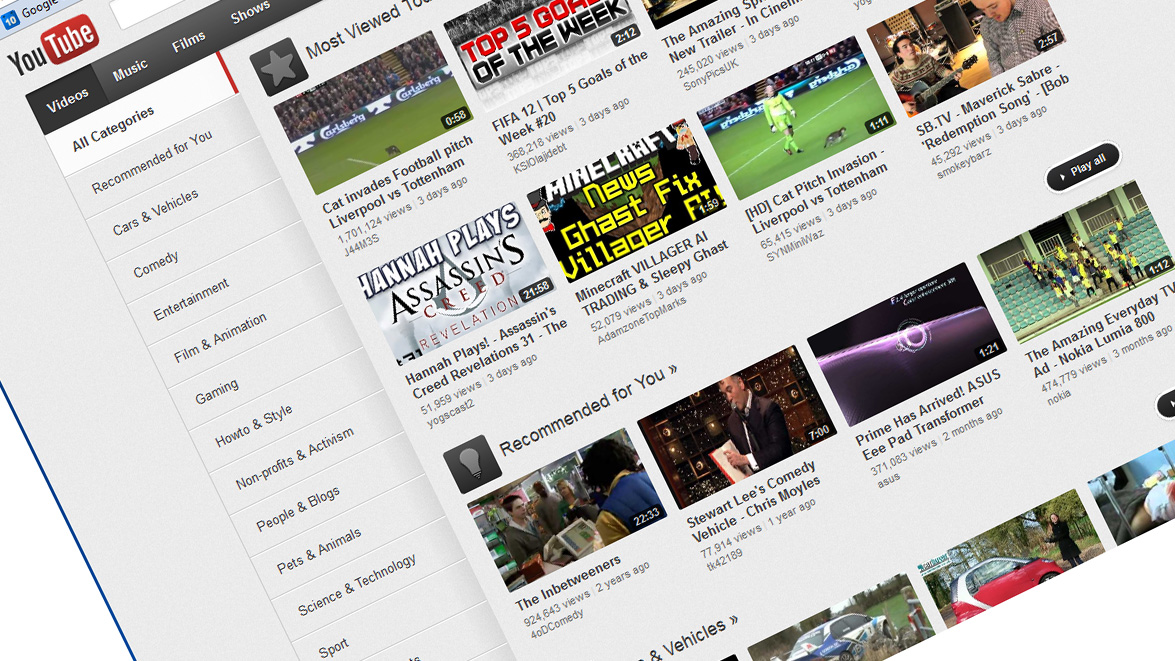Is YouTube close to becoming TheirTube?
User-generated videos are up but the professionals are taking over

YouTube celebrated its seventh birthday in the geekiest way possible this week – with a deluge of stats. Apparently there are now 72 hours of footage uploaded to the site every minute of every day which equates to a lot of Charlie Bit My Finger wannabes.
Seven years is a long time on the web – Zuckerberg was still working on Facebook in his dorm room when YouTube launched – and the YouTube of today is far different from the site that first began on the web back in 2005.
Where once amateur footage ruled the roost, the professionals are slowly but surely taking over.
This is where credit has to be given to Google. Its original owners Steve Chen and Chad Hurley were obviously visionaries but unlike Mark Zuckerberg with Facebook, they decided to take the money and run, leaving a mess of a site for Google to shape into its own vision.
It was a perfect fit for Google which has tried its hardest to grow the site and mould what was a lawless wasteland of video that breached all sorts of copyrights into a wholly legitimate service, with the video police now replacing pirated content with sad faces and blank screens.
Given this was the backbone of the site, it's a surprise YouTube managed to keep its community happy through the changeover but when you have spent $1.65 billion money has to be made.
Now, in 2006, $1.65 billion was a massive amount of money for an acquisition (it was certainly Google's biggest then, but now only a tenth of what it paid for Motorola) and there were plenty of analysts ready to shout that Google paid too much for the service.
Get daily insight, inspiration and deals in your inbox
Sign up for breaking news, reviews, opinion, top tech deals, and more.
But with Instagram going for two thirds of the price of the whole of YouTube, the whole thing now seems rather tame in comparison.
Video star
I remember working for a filmmaking magazine at the time of the sale, the now defunct Digital Video, and my editor fought tooth and nail to put YouTube on the front cover. It eventually did go on the front cover and we saw an upsurge in sales – it was a small surge but a victory for us.
We were adamant, and had been since YouTube's launch, that this would be the site to reinvigorate the camcorder market. It turns out we were wrong, the amateur footage became a by-product as the site fought to be more professional until what it has become now – part old-school MTV, part movie streaming service, part You've Been Framed For Doing The Funniest Things.
Unfortunately for those making camcorders, the 'upload to YouTube' button came too late, as consumers were already doing this with their mobile phones.
It's difficult to know if Google knew what it was getting into when it bought YouTube back in 2006 – it seemed to buy into the popularity of the site, but with that came myriad lawsuits. Viacom queued up to have their piece of the pie and it looked like the site would go the way of Napster.
It's almost as though the lawyers were waiting for a company with money to come along and snap it up before it decided to mine the copyright goldmine. Crazy we know.
Seven years on, though, and YouTube is doing rather well – even if Google is still cagey on how much money the site actually makes, you can't dispute its popularity.
Subscriptions have increased 50% and its users are now watching over 3 billion hours a month.
But there's still a lot to do. Google is pushing the movies more and more on the site, but it also has its own video site on the Google Play market so this section is not getting the pride and place it deserves.
It's made it easier to upload content and even edit it on-site and Google's birthday blog is all about the community that exists. But it's still playing a precarious balancing act, trying to keep both its dedicated users and uploaders and the money makers (movie, TV and music companies) happy.
It will be interesting which way the site goes in the next seven years.
Marc Chacksfield is the Editor In Chief, Shortlist.com at DC Thomson. He started out life as a movie writer for numerous (now defunct) magazines and soon found himself online - editing a gaggle of gadget sites, including TechRadar, Digital Camera World and Tom's Guide UK. At Shortlist you'll find him mostly writing about movies and tech, so no change there then.
